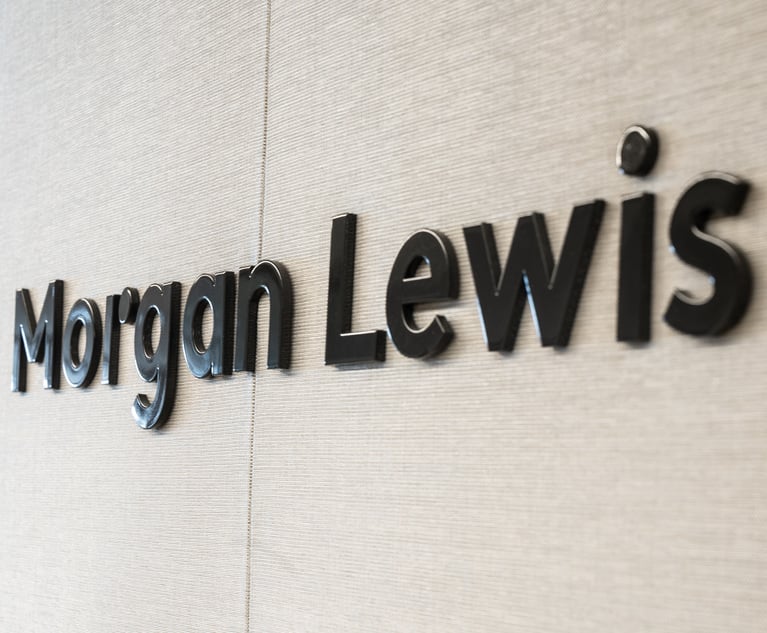Europe Sets Path for Regulation of Tech Around the World
Where the EU leads, the rest of the world tends to follow, a Hogan Lovells report says.
November 01, 2019 at 02:51 PM
4 minute read
 Tech giants. Photo: Shutterstock.com
Tech giants. Photo: Shutterstock.com
More than half of the world's legislative policies that target the global tech sector originated in Europe, according to a report issued by Hogan Lovells.
The report, titled 'A Turning Point for Tech', examines legislation and legislative initiatives in 16 legal jurisdictions in the first half of 2019. It found that more than half of the regulation aimed at the tech sector originates from the EU or its member states. By contrast, only 28% of legislation comes from the U.S. and 8% from Asia.
The report, written by lawyers across Hogan Lovells' global network, advises tech companies that regulation and antitrust enforcement are set to increase, and that they should be prepared to deal with their compliance obligations and the likely effect on their businesses.
"We expect competition law and regulation to continue playing a dual role – and tech companies need to find a coherent strategy to deal with both," the report states.
Hogan Lovells' report comes as Margrethe Vestager, the EU's antitrust head, is about to start her second term as the bloc's top competition enforcer. In recent speeches, she has promised to present new regulations aimed at ensuring fair competition in the tech sector. She has also said she will pursue more effective enforcement of antitrust rules.
In a speech in Dortmund, Germany on Tuesday, Vestager said she wanted to tackle the dominance of powerful digital platforms.
"In digital markets… being big can give a company such a huge head-start that it can be hard for smaller rivals to compete," she said. "Once a platform reaches a critical mass, the market can quickly tip in favour of that business, leaving no room for anyone else. We need to enforce the competition rules firmly, to stop digital platforms using their power to deny their rivals a chance to compete."
Vestager, who has been nominated as an executive vice-president of the European Commission with responsibility for digital issues as well as its competition head, said she was planning new regulation for digital platforms.
"Our digital future shouldn't just meet our needs as consumers – it should also respect our values as citizens. So alongside the competition rules, we also need regulations to make sure that platforms stick to those values."
Hogan Lovells' report says there is a global drive for greater regulation of the tech sector, "driven by competition law concerns for bricks-and-mortar businesses as well as by consumer protection concerns".
It notes that the EU has been a frontrunner in regulating tech and says where the bloc has led, the U.S. and other jurisdictions have followed suit. This is the case for antitrust enforcement. where U.S. federal authorities such as the Department of Justice and the Federal Trade Commission have launched their own inquiries into companies that the EU has investigated and sanctioned for anti-competitive behaviour.
This also applies to legislation such as the EU's General Data Protection Regulation (GDPR), which governs how individuals' personal data can be used by companies and public authorities. That legislation has influenced California's data privacy law.
The GDPR has been "an example of how Europe can shape the global playing field", the report states. "Looking at regulation coming from Brussels and EU member states, therefore, allows us to predict how global regulation may look in the coming years".
The report notes that calls for breaking up tech giants such as Google, Amazon and Facebook as a means of combating market dominance have been growing stronger in the U.S., while in the EU, "most stakeholders so far have considered this idea only as a measure of last resort".
"The European Commission has instead been levying multibillion-euro fines in an effort to curb anti-competitive practices of big tech companies by focusing on abuse of dominance cases, on access to data and dealing with tying of products and self-promotion of big tech's own offerings," Logan Breed, a partner in Hogan Lovells' Washington, D.C., office wrote.
The report also undermines the accusation that the EU is deliberately targeting successful U.S. tech companies with regulation and strong antitrust enforcement.
"Only 17% of the regulatory proposals we tracked name one or more of the leading U.S. tech companies, whereas the vast majority (83%) are company-agnostic and propose sector regulation," the report notes.
This content has been archived. It is available through our partners, LexisNexis® and Bloomberg Law.
To view this content, please continue to their sites.
Not a Lexis Subscriber?
Subscribe Now
Not a Bloomberg Law Subscriber?
Subscribe Now
NOT FOR REPRINT
© 2025 ALM Global, LLC, All Rights Reserved. Request academic re-use from www.copyright.com. All other uses, submit a request to [email protected]. For more information visit Asset & Logo Licensing.
You Might Like
View All
Morgan Lewis to Relocate to Former Goldman Sachs UK Building in £6.6M Annual Deal
1 minute read
Australian Class Action to be Launched Against Google Over Display Advertising
4 minute read
Reed Smith Bolsters Corporate Team With Markets Partner Hire in London
2 minute read
Trinity International Expands With Singapore Office, Eyes Growth in Infrastructure and Energy
Trending Stories
- 1Houston Law Firm Files $250K Breach of Contract Suit Against 2 Former Lawyers
- 2The Week in Data Feb. 3: A Look at Legal Industry Trends by the Numbers
- 3Mass Tort Cases: Challenges for Plaintiff’s and Defense Counsel
- 4Litigator of the Week Runners-Up and Shout-Outs: Davis Wright Tremaine, Wilmer and More
- 5Forum Clause Axes $844M Case Against Reinsurer Over Deadly Plane Crash, Judge Rules
Who Got The Work
J. Brugh Lower of Gibbons has entered an appearance for industrial equipment supplier Devco Corporation in a pending trademark infringement lawsuit. The suit, accusing the defendant of selling knock-off Graco products, was filed Dec. 18 in New Jersey District Court by Rivkin Radler on behalf of Graco Inc. and Graco Minnesota. The case, assigned to U.S. District Judge Zahid N. Quraishi, is 3:24-cv-11294, Graco Inc. et al v. Devco Corporation.
Who Got The Work
Rebecca Maller-Stein and Kent A. Yalowitz of Arnold & Porter Kaye Scholer have entered their appearances for Hanaco Venture Capital and its executives, Lior Prosor and David Frankel, in a pending securities lawsuit. The action, filed on Dec. 24 in New York Southern District Court by Zell, Aron & Co. on behalf of Goldeneye Advisors, accuses the defendants of negligently and fraudulently managing the plaintiff's $1 million investment. The case, assigned to U.S. District Judge Vernon S. Broderick, is 1:24-cv-09918, Goldeneye Advisors, LLC v. Hanaco Venture Capital, Ltd. et al.
Who Got The Work
Attorneys from A&O Shearman has stepped in as defense counsel for Toronto-Dominion Bank and other defendants in a pending securities class action. The suit, filed Dec. 11 in New York Southern District Court by Bleichmar Fonti & Auld, accuses the defendants of concealing the bank's 'pervasive' deficiencies in regards to its compliance with the Bank Secrecy Act and the quality of its anti-money laundering controls. The case, assigned to U.S. District Judge Arun Subramanian, is 1:24-cv-09445, Gonzalez v. The Toronto-Dominion Bank et al.
Who Got The Work
Crown Castle International, a Pennsylvania company providing shared communications infrastructure, has turned to Luke D. Wolf of Gordon Rees Scully Mansukhani to fend off a pending breach-of-contract lawsuit. The court action, filed Nov. 25 in Michigan Eastern District Court by Hooper Hathaway PC on behalf of The Town Residences LLC, accuses Crown Castle of failing to transfer approximately $30,000 in utility payments from T-Mobile in breach of a roof-top lease and assignment agreement. The case, assigned to U.S. District Judge Susan K. Declercq, is 2:24-cv-13131, The Town Residences LLC v. T-Mobile US, Inc. et al.
Who Got The Work
Wilfred P. Coronato and Daniel M. Schwartz of McCarter & English have stepped in as defense counsel to Electrolux Home Products Inc. in a pending product liability lawsuit. The court action, filed Nov. 26 in New York Eastern District Court by Poulos Lopiccolo PC and Nagel Rice LLP on behalf of David Stern, alleges that the defendant's refrigerators’ drawers and shelving repeatedly break and fall apart within months after purchase. The case, assigned to U.S. District Judge Joan M. Azrack, is 2:24-cv-08204, Stern v. Electrolux Home Products, Inc.
Featured Firms
Law Offices of Gary Martin Hays & Associates, P.C.
(470) 294-1674
Law Offices of Mark E. Salomone
(857) 444-6468
Smith & Hassler
(713) 739-1250








